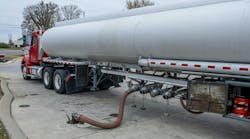Over 10 years ago, mobile communications providers entered the transportation marketplace to offer fleet operators a means to better utilize their assets while generating revenue for their organization. And while the acceptance and economic benefits of these systems have been far reaching, location and communication technology has provided more than vendors or fleets ever imagined. Today's location and messaging platforms are, by their design, making our highways safer for all.
Within the longhaul trucking segment of the transportation industry, drivers can now send and receive load-status information, map shortest routes to destinations, and communicate with family members while in their mobile environment. Voice-activated messaging capabilities enable drivers to communicate with both hands on the steering wheel and both eyes on the road; other travelers enjoy a more secure environment around the larger trucks.
In addition, fleets are able to keep drivers on the highways heading to their destinations, instead of at truck stops on pay phones or at rest stops operating equipment that requires focus and keyboard typing. Since a majority of truck-related accidents occur when trucks are entering or exiting parking lots and rest areas, a mobile communications system that allows the drivers to stay on the highway, focused on the task of driving, potentially reduces the number of these types of collisions.
Though adoption of these technologies began with longhaul trucking, their use and safety benefits are starting to permeate many other fleet applications. Like their over-the-road counterparts, regional service drivers using mobile communications with hands-free capabilities can now obtain route information and messages from dispatch while traveling between calls, keeping focused on the road.
To meet the specific operational requirements of this segment, mobile communications technology has been refined and enhanced with the service vehicle technicians' safety in mind. For instance, service often takes technicians away from their vehicle; therefore, a system with a panic-alarm key fob that can be activated by a technician in trouble can immediately summon an emergency response team to the location.
Knowing the location of a fleet's untethered trailers is the latest benefit of implementing mobile communications systems throughout transportation fleets. Systems that attach directly to the trailer, and operate independently of the tractor, offer fleet managers a view of these trailers and provide location and status reports at requested intervals.
Once again, it is anticipated that location technology will add numerous safety benefits beyond initial productivity gains. Much like a home security system with a sign advertising its presence on the mailbox, it is anticipated that trailers with externally mounted monitoring devices are less likely to be tampered with or hijacked, providing an added security benefit for the driver, trailer and shipper.
Looking at the bigger picture, the transportation industry's increasing use of mobile communications systems in itself helps foster a much safer, more secure and productive environment for operating all types of on-road vehicles. At any time of the day or night, there are mobile communications systems on Interstate highways, metropolitan streets and rural roads that act as traffic-safety patrols for the entire traffic population.


